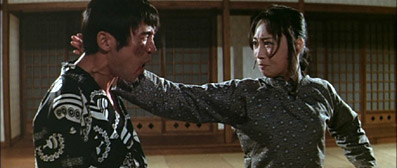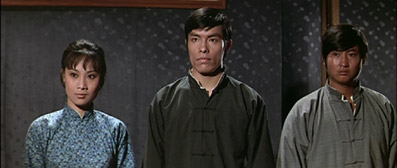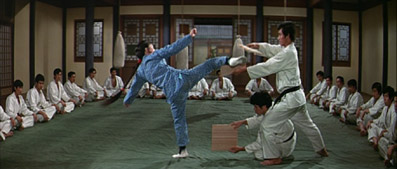|
Back
in the days when martial arts cinema first exploded in the
UK, when I was lying my way into see them by dressing up,
standing tall and badly faking an 18-year-old's cocky self-confidence,
there were certain films that made a particular impact on
a kid who was starry-eyed at a genre that seemed to him
to exist solely to make his teenage years
more tolerable. Among these were Chang-hwa Jeong's 1972
King Boxer (aka The Five Fingers
of Death, the very first kung-fu film I saw), absolutely
everything with Bruce Lee in it, and Hapkido.
The last of these was a revelation not just for me but
for all of my fellow genre fans and for one simple reason –
it was the first kung-fu film we'd seen that featured a
female lead. And she was dynamite. At least that's what
we thought. We were 14 years old, for pity's sake, and Angela
Mao – for that was her name – was beautiful and deadly. To
us she was Emma Peel crossed with Bruce Lee and we all
fell in love.

A
long time has passed since then and the film effectively
vanished from my field of vision. It remained a title, a
memory of a happy time spent in the cinema. Actually recalling
plot or any other specifics proved increasingly difficult,
beyond the certainty that the fights were great and there was
some serious leaping at one point. It's hard to describe
how excited I was on hearing the news that Hong Kong Legends
were restoring and releasing the film on UK DVD, although
my enthusiasm was tinged by a touch of apprehension. It
had been a long time, I'd only seen it once, and I had an
adolescent boy's crush on the female star. After all these
years and all the movies I've seen since, would it live
up to my expectations?
Believe
it or not, it actually surpassed them.
OK,
not everything has aged comfortably. As with Lee's
Fist of Fury of the same year, the central
conflict here is racial in nature, with the Japanese cast
squarely as the bad guys. Now given Japan's history as an
aggressor in both China and Korea, it is inevitable that
past hostilities should find their way into movies, especially
those set during periods of occupation. But I never feel
comfortable with bad guys who are identified as being irredeemably bad purely
on the grounds of their race, and they do bang on about
it in Hapkido – few opportunities are missed
to curse the evil Japanese or get horrified at their cartoonishly
heartless nastiness. But if you can set this element aside
(and as a Japanophile I had to made a big effort here),
in the areas that count, Hapkido is an absolute
belter.
Having
loudly established the Japanese as the villains, the charmingly
dated but action-packed opening credits morph into an extended
sequence whose main purpose is to introduce the audience
to hapkido itself, a Korean martial art whose fifty
year evolution, principally under the direction of Yong
Sul Choi, was not actually given a name until 1957 and was shaped
into the fighting technique recognised today by Master Han
Jae Ji. OK, few of us are tuning in to any martial arts
film for a history lesson, but Hapkido's first ace-in-the-hole
is that the film's Korean master, the one training the visiting
Chinese students who are soon to return home and start their
own schools, is none other than Han Jae Ji himself. Thus when he demonstrates to his students just how it should
be done he does so with authority and thrilling skill.

Once
back in Hong Kong, three of the students – played by Angela
Mao, Carter Wong and Sammo Hung (all superb) – set up their
hapkido school and set about introducing themselves to the
masters at all of the other martial arts establishments
in the district. All of this goes well enough, but wouldn't
you know it, there's the Japanese-run Black Bear School
(whose students' ability to fight energetically even when
falling-down drunk is actually rather impressive), and even
before any official introductions have been attempted, the
hot-headed Sammo gives two of them a sound seeing-to after
they refuse to pay a restaurant bill. It all goes downhill from there
in very typical generic fashion, as a tit-for-tat battle
between the dynamic trio and the Black Bear School ensues,
in the process increasing the similarities with Fist
of Fury, which danced in the same arena in similar
fashion.
But
let's be honest, you didn't come for the story, you came
for the action, and here's where the film soars. I would
suggest that the comparisons with Fist of Fury
extend beyond plot and year of release to include the fight
choreography and martial arts skills of the stars. All three
are on-screen dynamite here, none more so that the fabulous Mao,
who proves every bit as explosive as I remember – man, this
woman can execute four consecutive, high speed, perfectly
aimed roundhouse kicks without drawing breath. This is old
school martial arts at its most awe-inspiring, with a series
of blistering battles created completely in the fight choreography
rather than the editing suite, with wide and mid shots used
to showcase the skills of the performers, alternated with
mobile hand-held footage that places us in the centre of
the action and matches its energy. There's even a bit of
ultra slow motion to really show off the awesome agility
of some of the moves. The pace of the action means you'll
have to look fast for the early appearances by Yeun Biao
and Jackie Chan.
In
all respects Hapkido is a most worthy companion
piece to Fist of Fury and absolutely deserves
to be held in similarly high regard. Hong Kong Legends are
marketing this release as a rediscovered classic, a potentially
risky claim that for my money is fully justified. This really
is what martial arts cinema is all about.
OK,
the film was released back in 1972 and has not been widely
seen here since, so we have to make allowances. Wait a minute,
no we don't, it looks terrific! Hong Kong Legends have done
it again, providing a generally first class 2.35:1 anamorphic
transfer from a near perfect condition high-definition original.
The picture is sharp without too much in the way of edge
enhancement (there's evidence of some, but it's not painful),
and colour and contrast are generally very good. The latter
does vary a little, being a tad strong at times and a little
weaker at others, although the margin of variance is not
great (it does change mid-shot at one point). On the whole,
another great job from HKL.

The
original mono Mandarin soundtrack has been supplemented
by Mandarin and English 5.1 remixes. The 5.1 Mandarin track
has clearer voice reproduction than the mono original, and
the music has been sonically opened out. Some sound effects
are also clearer, but it should be noted that some appear
to have been re-recorded or even added – background birdsong
and distant barking dogs on the 5.1 track do not appear
on the mono.
I
promise that this is the last time I'll go on about this,
but this is one film that cries out for the sort of detailed
expertise that Bey Logan used to bring to films of this era,
providing biographical information on the participants and
technical data on the martial art itself. Maybe one day
he'll return to the fold to do a special edition.
What
we do have is a some expert opinion on hapkido itself from
instructor at the UK-based Chang's Hapkido Academy, Tammy Parlour.
First of all she provides a blow-by-blow breakdown of Master
Ji's post credits martial arts demonstration in Hapkido
Examined (3:41), then is interviewed about
herself, the martial art and the film in more detail in
Interview with Tammy Parlour
(14:43). Both proved interesting enough to prompt some immediate
research on Han Jae Ji and the development of his martial
art.
We
also have the usual Hong Kong Legends produced UK
Promo (1:08), which sells the film quite well
as old school kung fu for a new generation of fans.
Finally we have the Original Theatrical Trailer
(4:11), which does a decent job of selling the film
as an action classic by stringing some of the best fight
footage together and identifying the fighting credentials
of its participants. Like the film, it's in fine condition.
There
is nothing here that is likely to win over those not sympathetic
to martial arts cinema, but if you're already a fan then
this is an absolute must-have, one of the early genre greats
that has been very impressively restored for this Hong Kong
Legends release. If you've only seen Angela Mao in her small
role as Bruce Lee's sister in Enter the Dragon,
you owe it to yourself you see just how great a martial
arts performer she was, and as a bonus you get a whole host
of other fine fighters all demonstrating their considerable
skills, including the man who invented the
martial art of the title. If you want to know why many of us still prefer
the old-school kung-fu films,
you need look no further than Hapkido.
|